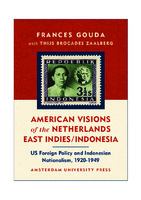American Visions of the Netherlands East Indies/Indonesia
US Foreign Policy and Indonesian Nationalism, 1920-1949
| dc.contributor.author | Gouda, Frances | |
| dc.contributor.author | Brocades Zaalberg, Thijs | |
| dc.date.accessioned | 2010-12-31 23:55:55 | |
| dc.date.accessioned | 2019-12-10 14:46:32 | |
| dc.date.accessioned | 2020-04-01T15:32:38Z | |
| dc.date.available | 2020-04-01T15:32:38Z | |
| dc.date.issued | 2002 | |
| dc.identifier | 340274 | |
| dc.identifier | OCN: 55842798 | en_US |
| dc.identifier.uri | http://library.oapen.org/handle/20.500.12657/35075 | |
| dc.description.abstract | The authors of this book challenge the view that was current among many people in the Netherlands during the period 1945-1949 that the American government and its foreign policymakers unequivocally backed the Indonesian Republic's struggle for independence. The same myth of America's political endorsement of Indonesians' quest for independence continues to reverberate in the United States itself. In fact, ex-President Clinton repeated the story as recently as 1995 when he wrote to ex-President Suharto that in the post-World War II era, President Truman and the U.S. Congress had actively supported Indonesia 'as the nation was being born'. On the basis of research in American, Indonesian, Dutch, and Australian diplomatic records and in the archives of the United Nations, Gouda and Brocades Zaalberg describe and analyze American visions of the Dutch East Indies/Indonesia from the 1920s to December 1949, when the Kingdom of the Netherlands relinquished its sovereignty over the archipelago in southeast Asia to the United States fo Indonesia. Their historical analysis suggests that the American diplomatic establishment was not as ignorant of conditions in the Indonesian archipelago as many Dutch people assumed, both before and after World War II. They also chronicle the unfolding of America's steady but tactic backing of its faithful Dutch ally in northern Europe until early 1949, when U.S. assessments of the regions in the world where the Cold War might ignite into a 'Hot War' began to incorporate the anti-colonial, nationalist struggles in Indonesia and Vietnam. | |
| dc.language | English | |
| dc.relation.ispartofseries | American Studies | |
| dc.subject.classification | thema EDItEUR::N History and Archaeology::NH History | en_US |
| dc.subject.classification | thema EDItEUR::J Society and Social Sciences::JP Politics and government | en_US |
| dc.subject.other | peace operations | |
| dc.subject.other | geschiedenis | |
| dc.subject.other | kosovo (kfor) | |
| dc.subject.other | military occupation | |
| dc.subject.other | world war ii / second world war | |
| dc.subject.other | political science | |
| dc.subject.other | civil-military cooperation (cimic) | |
| dc.subject.other | history of the united states | |
| dc.subject.other | somalia (unitaf) | |
| dc.subject.other | bosnia (ifor/sfor) | |
| dc.subject.other | civil affairs | |
| dc.subject.other | cambodia (untac) | |
| dc.subject.other | politicologie | |
| dc.subject.other | history, geography, and auxiliary disciplines | |
| dc.subject.other | geschiedenis van de usa | |
| dc.subject.other | counterinsurgency | |
| dc.title | American Visions of the Netherlands East Indies/Indonesia | |
| dc.title.alternative | US Foreign Policy and Indonesian Nationalism, 1920-1949 | |
| dc.type | book | |
| oapen.abstract.otherlanguage | De auteurs van 'American Visions of the Netherlands East Indies/Indonesia bestrijden de idee dat de Amerikaanse regering en haar buitenlandse beleidsmakers onvoorwaardelijk steun verleenden aan de onafhankelijkheidsstrijd van de Indonesische Republiek, zoals vele Nederlandse geloofden gedurende de periode 1945-1949. Ook in de Verenigde Staten zelf leeft de mythe over Amerika's politieke steun aan de vrijheidheidsstrijd in Indonesie voort. Nog in 1995 zelfs, herhaalde ex-president Clinton het verhaal toen hij ex-president Soeharto schreef dat president Truman en het Amerikaans Congres in de periode na WO II actief hun steun hadden betuigd aan Indonesië als 'een natie die geboren werd'. Op basis van onderzoek in Amerikaanse, Indonesische, Nederlandse en Australische diplomatieke archieven, als ook in de archieven van de Verenigde Naties, beschrijven en analyseren Gouda en Brocades Zaalberg de Amerikaanse visies op Nederlands Indië/Indonesië vanaf de twintiger jaren van de vorige eeuw tot december 1949 toen het Koninkrijk der Nederlanden haar gezag over de archipel in zuidoost Azië overdroeg aan de Verenigde Republiek van Indonesië. De historische analyse die hier gepresenteerd wordt, suggereert dat het Amerikaanse corps diplomatique niet zo onbekend was met de situatie op de Indonesische eilanden als vele Nederlanders zowel voor als na de Tweede Wereldoorlog veronderstelden. De auteurs boekstaven eveneens de ontwikkeling van Amerika's doorlopende maar stille steun aan de trouwe Hollandse bondgenoot in noord-Europa tot aan het begin van 1949 toen de Amerikaanse aandacht voor die gebieden in de wereld waar de Koude Oorlog zou kunnen uitmonden in een 'Hete Oorlog' zich verder uitbreidde naar de de anti-koloniale, nationalistische strijd in Indonesië en Vietnam. | |
| oapen.identifier.doi | 10.5117/9789053564790 | |
| oapen.relation.isPublishedBy | dd3d1a33-0ac2-4cfe-a101-355ae1bd857a | |
| oapen.relation.isbn | 9789053564790 | |
| oapen.pages | 382 | |
| oapen.identifier.ocn | 55842798 |

